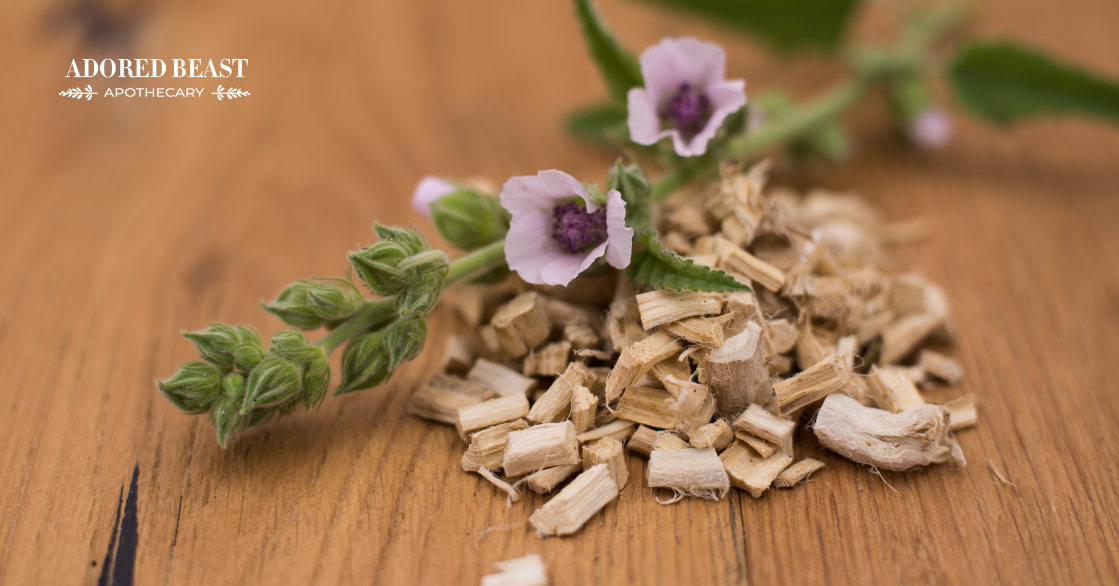As a natural animal supplement company, we rely a lot on Mother Nature. We look to her for the answers first, and use what she provides whenever we possibly can.
And one of the ingredients we love, love, love is marshmallow root for dogs and cats. We’ve learned over the years that this unassuming little plant has big benefits! And that’s why it features prominently in a number of our different products.
But what is marshmallow root exactly, and why do we like it so much for our animals? Let’s dive right in!
What is Marshmallow Root?
Marshmallow root (Althaea officinalis) is a perennial herb that’s native to Europe, Western Asia, and Northern Africa. The plant’s stem and leaves are fleshy, and its white flower has five petals.
Like so many of the plants we rely upon for natural healing, marshmallow root has a long history! In fact, its medicinal use was first recorded in the 9th century BC. The scientific name for marshmallow root comes from the Greek word altho, which means to cure. If that doesn’t vouch for its powers, I don’t know what would!
Looking at the history, it is believed that marshmallow root was first used for healing by ancient Egyptians. They boiled the root with honey to create a thick paste, which was then used to soothe coughs and sore throats and to heal wounds. We know that the Greek physician Hippocrates used marshmallow root for wound healing as well. In the Middle Ages, physicians gave patients the sap in a tea to soothe colds and sore throats.
So marshmallows are healthy!?! Nope, sorry. Unfortunately, despite their name, those ooey gooey little globs you use to make s’mores don’t actually contain any marshmallow root. They’re not going to boost your health. Skip feeding them to your pet because they are full of sugar and chemicals 🙁
The plant though? Well that’s a totally different story!
The Benefits of Marshmallow Root for Dogs and Cats
Marshmallow root is a demulcent plant. That means it contains a polysaccharide molecular complex called mucilage. The benefits of marshmallow root for dogs and cats come mainly from this mucilage, which has a variety of different actions in the body:
- Expectorant – thins and loosens mucus, which helps to expel it from the respiratory tract.
- Diuretic – helps the kidneys put extra salt and water into urine, clearing extra fluid out of the body. This, in turn, can help lower blood sugar.
- Anti-microbial – stops the growth of pathogenic bacteria.
- Anti-inflammatory – can help soothe and protect inflamed tissues.
- Antioxidant – helps protect the body from damage caused by free radicals.
- Analgesic – can help relieve pain.
Wow, that’s some pretty powerful goo, right?
So how it is helpful for our animals?
1. Digestive Issues
Remember that mucilage we just mentioned? Well, when this mucilage comes in contact with water, it turns into a slimy, gel-like substance. And this gel is magical…
Think about when you apply aloe vera to a sunburn. Right away, you get that soothing relief, and you can feel that protective layer forming on your skin. You can almost hear your body saying, “ahhh, thank you.” That’s how your gut (or your pet’s gut) feels when you take marshmallow root. When you ingest it, whether on its own or in a supplement, and it makes its way through the body, it’s like it’s coming into contact with water. That same gel-like substance forms and coats the inside of an animal’s digestive tract, lubricating and helping promote mucous secretions. This helps reduce the inflammation within the digestive tract.
Because the mucilage coats the digestive tract, it’s a go-to for digestive issues. This includes things like:
- diarrhea
- constipation
- irritable bowel disease
- nausea and vomiting
- acid reflux
2. Respiratory Issues
The mucilage coats and soothes the respiratory tract in much the same way as it does the digestive tract. And because its an expectorant, it can thin out and loosen built-up mucus, which helps to expel it from the respiratory tract.
In fact, a small study from 2005 found that an herbal cough syrup containing marshmallow root helped relieve coughs associated with colds, bronchitis, or respiratory tract diseases characterized by mucus formation. Plus, the analgesic properties can help relieve pain.
Because of this, it can be very helpful for conditions like:
- coughs (like kennel cough, in combination with other modalities and supplements)
- sore throat
- respiratory tract disease
- bronchitis
- sore throat
- asthma
- Collapsing trachea
- COPD
[RELATED] For more ways to support a dog with kennel cough, read this next.
3. Urinary Issues
Since marshmallow root has diuretic properties, it can be a big help to the urinary tract. This is because diuretics help the body to flush out excess fluid, which helps cleanse the kidneys and the bladder.
The mucilage pops up here yet again, as it coats the urinary tract, protecting its lining and soothing irritation and inflammation.
Additionally, the antimicrobial properties can help protect the body against bacterial growth, which is key in keeping the urinary tract healthy. And again, those analgesic pain-relieving properties can be a big help with things like urinary tract infections, bladder infections, or interstitial cystitis (sterile cystitis).
How to Use it
There are several different ways to use marshmallow root for animals (or yourself). It is pretty easy to find – most health food stores carry it, and you can usually find it in various different forms: tinctures, teas, dry herb, or powder.
In supplement form is probably the easiest. If you find a single marshmallow root supplement, start small to find the right amount for your pet’s individual needs. Mix it in with their regular food – most pets don’t mind it. You can work up to:
- ¼ teaspoon for cats and small dogs
- ½ teaspoon for larger dogs
Or, find one that has the marshmallow root combined with other ingredients, such as our Gut Soothe or Easy Peesy II. These both have marshmallow root combined with things like slippery elm and pre and probiotics to provide a well-rounded health kick.
When it comes to natural health and healing, marshmallow root can be a wonderful natural substance to turn to for its versatility. Happy healing!












